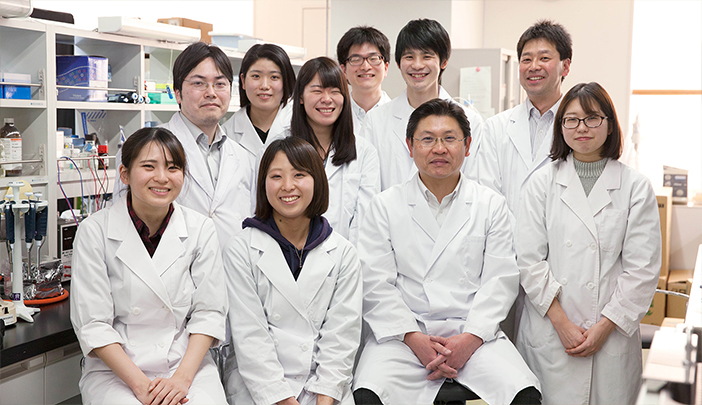 Researchers
Researchers
- HOME
- English
- Researchers
- OSABE Makoto, Ph.D. / Associate Professor
OSABE Makoto, Ph.D. / Associate Professor
Division of Pharmaceutical Health Biosciences
Department of Pharmaceutical Sciences

Research Topics
1. Molecular and cellular mechanisms of peroxisome proliferator-activated receptors (PPARs) activation.
2. Determining the regulatory mechanism of PPARs-mediated function.
3. Biomarkers for prediction of idiosyncratic adverse drug reactions and its molecular mechanisms.
Peroxisome proliferator-activated receptors (PPARs) are ligand-activated transcription factors belonging to the nuclear receptor family. PPARs function as regulators of lipid and lipoprotein metabolism and glucose homeostasis and influence cellular proliferation, differentiation and apoptosis. We investigate the molecular and cellular mechanisms of PPARs activation, focusing on those xenobiotics that activate the receptor without the direct binding. Idiosyncratic adverse drug reactions (IADRs), as seen in Stevens–Johnson syndrome (SJS) and toxic epidermal necrolysis (TEN), are unpredictable and potentially life threatening. These reactions involve immune mechanisms, and genetic association studies have identified strong links between hypersensitivity to specific drugs and certain human leukocyte antigen (HLA) alleles. We investigate the biomarkers for prediction of SJS/TEN associated with mogamulizumab, a humanized anti-CC chemokine receptor 4 (CCR4) monoclonal antibody.
Representative Publications
1. Osabe M, Tajika T, Tohkin M: Allopurinol suppresses expression of the regulatory T cell migration factors TARC/CCL17 and MDC/CCL22 in HaCaT keratinocytes via restriction of NF-κB activation. J. Appl. Toxicol. 2017 38(2), 274-283.
2. Shizu R, Osabe M, Perera L, Moore R, Sueyoshi T, Negishi M: Phosphorylated nuclear receptor CAR forms a homodimer to repress its constitutive activity for ligand activation. Mol Cell Biol 2017, 37(10): e00649-16
3. Osabe M, Negishi M: Active ERK1/2 protein interacts with the phosphorylated nuclear constitutive active/androstane receptor (CAR; NR1I3), repressing dephosphorylation and sequestering CAR in the cytoplasm. J. Biol. Chem. 2011, 286(41): 35763-35769.

 JP
JP ACCESS
ACCESS SNS
SNS



 受験生の方へ
受験生の方へ 在学生の方へ
在学生の方へ 資料請求
資料請求 SNS
SNS ENGLISH
ENGLISH LMS
LMS 交通アクセス
交通アクセス 採用情報
採用情報
 お問い合わせ
お問い合わせ